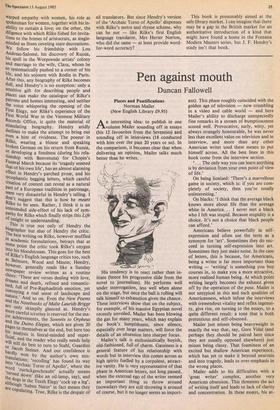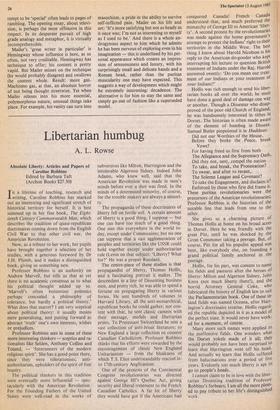Pen against mouth
Duncan Fallowell
Pieces and Pontifications Norman Mailer (New English Library £9.95)
A n interesting idea: to publish in one InLvolume Mailer sounding off in essays (his 12 favourites from the Seventies) and sounding off in interviews (18 conducted with him over the past 20 years or so). In the comparison, it becomes clear that when delivering an opinion, Mailer talks much better than he writes.
His tendency is to react rather than in- itiate (hence his progressive slide from the novel to journalism). He performs well under interrogation, less well when alone on the stage, but once the ball is rolling will talk himself to exhaustion given the chance. These interviews show that on the subject, for example, of his massive Egyptian novel recently unveiled, Mailer has been blowing the gas for many years, which may explain the book's lumpishness, since silence, especially over large matters, will force the details of an obsession into sharper focus.
Mailer's talk is enthusiastically boyish, old-fashioned, full of charm. Gassiness is a general feature of his relationship with words but in interview this comes across as high spirits fuelled by a corpulent, attract- ive vanity. He is very representative of that phase in American letters, not long passed, when the external ego of the writer seemed an important thing to throw around (nowadays they are still throwing it around of course, but it no longer seems so import-
ant). This phase roughly coincided with the golden age of television — now crumbling in a video and cable world — and here Mailer's ability to discharge unexpectedly fine remarks in a stream of bumptiousness scored well. Provocative, surly, witty, yet always strangely honourable, he was never less than excellent value on television and in interview, and more than any other American writer used these means to put himself across. All the best lines in this book come from the interview section.
. .. The only way you can learn anything is by deviation from your own point of view of life.'
On being lionised: 'There's a marvellous game in society, which is: if you are com- pletely of society, then you're totally uninteresting.'
On blacks: 'I think that the average black knows more about life than the average white in America... I never met a black who I felt was stupid. Because stupidity is a choice. It's not a choice that black people can afford.'
Americans believe powerfully in self- expression and often use the term as a synonym for 'art'. Sometimes they do suc- ceed in turning self-expression into art. Sometimes they just make noise. In the case of letters, this is because, for Americans, being a writer is far more important than writing — 'writing' is something you buy courses in, to make you a more attractive, more realised human being. At which point writing largely becomes the exhaust given off by the operation of the pose. Mailer is not untypical in this and such qualities of Americanness, which infuse the interviews with tremendous vitality and reflex ingenui- ty, give rise, on turning to the essays, to a quite different result: a tone that is both pretentious and self-obsessed.
Mailer just misses being heavyweight in exactly the way that, say, Gore Vidal (and perhaps they should be paired here since they are usually opposed elsewhere) just misses being classy. That foaminess of an excited but shallow American experience, which has yet to make it beyond neurosis and into tragedy, leads to over-emphasis in the wrong places.
Mailer adds to his difficulties with a `great writer' complex, another very American obsession. This threatens the act of writing itself and leads to lack of clarity and concentration. In these essays, his at- tempt to be 'special' often leads to pages of rambling. The opening essay, about televi- sion, is perhaps the most offensive in this respect. In its desperate pursuit of high grade analogy and metaphor, it is virtually incomprehensible.
Mailer's 'great writer in particular' is Hemingway whose influence is here, as so often, not very creditable. Hemingway has technique to offer; his content is pretty vapid. But Mailer misses on the technique (he would probably disagree) and swallows the content whole. Result: more gas. Machismo gas, at that, an absolute horror of not being thought streetwise. Yet when Mailer relaxes into his more essential, polymorphous nature, unusual things take place. For example, his vanity can turn into masochism, a pride in the ability to survive self-inflicted pain. Mailer on his life and art: 'It's more satisfying but not as heady as it once was; I'm not as interesting to myself as I used to be.' And there is a whole an- drogynous aspect to him which he admits he has been nervous of exploring even in his imagination — this is underlined by his per- sonal appearance which creates an impres- sion of sensuousness and luxury, with his surprisingly small and delicate hands and a Roman head, rather than the puritan muscularity one may have expected. This suggests a way of development which might be extremely interesting: decadence. The alternative is for him to stay the same and simply go out of fashion like a superseded model.







































 Previous page
Previous page